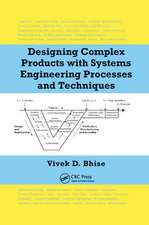Decision-Making in Energy Systems
Autor Vivek D. Bhiseen Limba Engleză Paperback – 7 oct 2024
Decision-Making in Energy Systems discusses subjective as well as objective methods, approaches, and techniques taken from the systems and industrial engineering domain and puts them to use in solving energy systems problems. It uses an integrated approach by including effects of all technical, economic, environmental, and safety considerations as well as costs and risks. The book is specially designed for practicing engineers from industrial/systems engineering who work in energy systems engineering industries.
Aimed at graduate students, researchers, and managers involved in various energy generating, distributing, and consuming companies, the book helps the reader to understand, evaluate, and decide on solutions to their energy-related problems.
| Toate formatele și edițiile | Preț | Express |
|---|---|---|
| Paperback (1) | 317.84 lei 6-8 săpt. | |
| CRC Press – 7 oct 2024 | 317.84 lei 6-8 săpt. | |
| Hardback (1) | 791.62 lei 6-8 săpt. | |
| CRC Press – 28 dec 2021 | 791.62 lei 6-8 săpt. |
Preț: 317.84 lei
Preț vechi: 359.37 lei
-12% Nou
Puncte Express: 477
Preț estimativ în valută:
60.83€ • 63.27$ • 50.22£
60.83€ • 63.27$ • 50.22£
Carte tipărită la comandă
Livrare economică 14-28 aprilie
Preluare comenzi: 021 569.72.76
Specificații
ISBN-13: 9780367620189
ISBN-10: 0367620189
Pagini: 386
Ilustrații: 78
Dimensiuni: 156 x 234 mm
Greutate: 0.71 kg
Ediția:1
Editura: CRC Press
Colecția CRC Press
Locul publicării:Boca Raton, United States
ISBN-10: 0367620189
Pagini: 386
Ilustrații: 78
Dimensiuni: 156 x 234 mm
Greutate: 0.71 kg
Ediția:1
Editura: CRC Press
Colecția CRC Press
Locul publicării:Boca Raton, United States
Public țintă
Professional, Professional Practice & Development, and Undergraduate AdvancedCuprins
SECTION I Core Building Blocks. Chapter 1. Energy Systems, Problems and Risks. Chapter 2. The Energy Picture. Chapter 3. Risk Assessment Methods. Chapter 4. Systems Engineering in Energy Systems Projects. Chapter 5. Safety Engineering in Energy Systems. SECTION II Measurements, Analysis and Decision Making. Chapter 6. Decision Making Approaches. Chapter 7. Costs, Revenues and Time Considerations. Chapter 8. Cost-Benefit Analysis. Chapter 9. Subjective Methods for Risk Assessment. SECTION III Customers, Governments and Future Changes. Chapter 10. Energy Users, Societal Needs and Energy Providers. Chapter 11. Government Regulations. Chapter 12. Meeting Future Automotive Fuel Economy and Emissions Requirements. SECTION IV Current Issues Facing the Energy Industries. Chapter 13. Smart Grid. Chapter 14. Electricity Storage Technologies. Chapter 15. Infrastructure Standardization for Electric Vehicles. SECTION V Applications of Methods: Examples and Illustrations. Chapter 16. Selection of Power Generation Alternatives. Chapter 17. Sensitivity and Monte Carlo Analyses. Appendix 1. Terminology, Acronyms, Abbreviation and Units. Appendix 2. Project: Cost Benefit Analysis of Residential Photovoltaic Solar Panels. Appendix 3. Project: Fault Tree and Reliability Analyses. Appendix 4. Project: Decision-Making and Analytical Hierarchical Process. Appendix 5. Project: Analysis of an Energy Problem.
Notă biografică
Vivek D. Bhise is currently a LEO Lecturer/Visiting Professor and a Professor in post-retirement of Industrial and Manufacturing Systems Engineering at the University of Michigan-Dearborn. He received his B.Tech. in Mechanical Engineering (1965) from the Indian Institute of Technology, Bombay, India, M.S. in Industrial Engineering (1966) from the University of California, Berkeley, California and Ph.D. in Industrial and Systems Engineering (1971) from the Ohio State University, Columbus, Ohio. During 1973 to 2001, he held several management and research positions at the Ford Motor Company in Dearborn, Michigan. He was the manager of Consumer Ergonomics Strategy and Technology within the Corporate Quality Office, and the manager of the Human Factors Engineering and Ergonomics in the Corporate Design of the Ford Motor Company where he was responsible for the ergonomics attribute in the design of car and truck products.Dr. Bhise is the author of recent books entitled "Ergonomics in the Automotive Design Process" (ISBN: 978-1-4398-4210-2. Boca Raton, FL: CRC Press, 2012), “Designing Complex Products with Systems Engineering Processes and Techniques” (ISBN: 978-1-4665-0703-6. Boca Raton, FL: CRC Press, 2014.) and “Automotive Product Development: A Systems Engineering Implementation” (ISBN: 978-1-4987-0681-0. Boca Raton, FL: CRC Press, 2017). He has also written over 100 technical papers in the design and evaluation of automotive interiors, parametric modeling of vehicle packaging, vehicle lighting systems, field of view from vehicles, and modeling of human performance in different driver/user tasks. Dr. Bhise has taught graduate courses in Vehicle Ergonomics, Vehicle Package Engineering, Automotive Systems Engineering, Management of Product and Process Design, Work Methods and Industrial Ergonomics, Human Factors Engineering, Total Quality Management and Six Sigma, Quantitative Methods in Quality Engineering, Energy Evaluation, Risk Analysis and Optimization, Product Design and Evaluations, Safety Engineering, Computer-Aided Product Design and Manufacturing, and Statistics and Probability Theory over the past 39 years (1980-2001 as an adjunct professor, 2001-2009 as a professor, and 2009-present as a visiting professor in post-retirement) at the University of Michigan-Dearborn. He also worked on several research projects in human factors with Late Prof. Thomas Rockwell at the Driving Research Laboratory at the Ohio State University (1968-1973). Dr. Bhise has served as an expert witness on cases involving automotive ergonomics, quality, and safety, patent infringement and highway safety.He received the Human Factors Society's A. R. Lauer Award for Outstanding Contributions to the Understanding of Driver Behavior in 1987. He has served on several committees of the Society of Automotive Engineers (SAE), the Motor Vehicles Manufacturers Association (MVMA) the Transportation Research Board (TRB) of the National Academies and the Human Factors and Ergonomics Society (HFES).
Descriere
This is a comprehensive book on how to make complex decisions on energy systems problems involving different technologies, environmental effects, costs, benefits, risks, and safety issues.



















